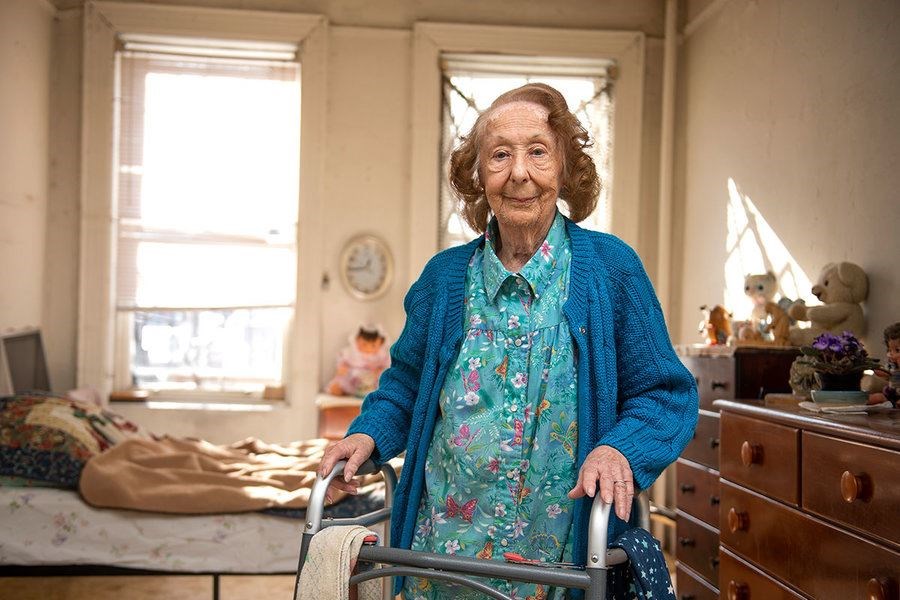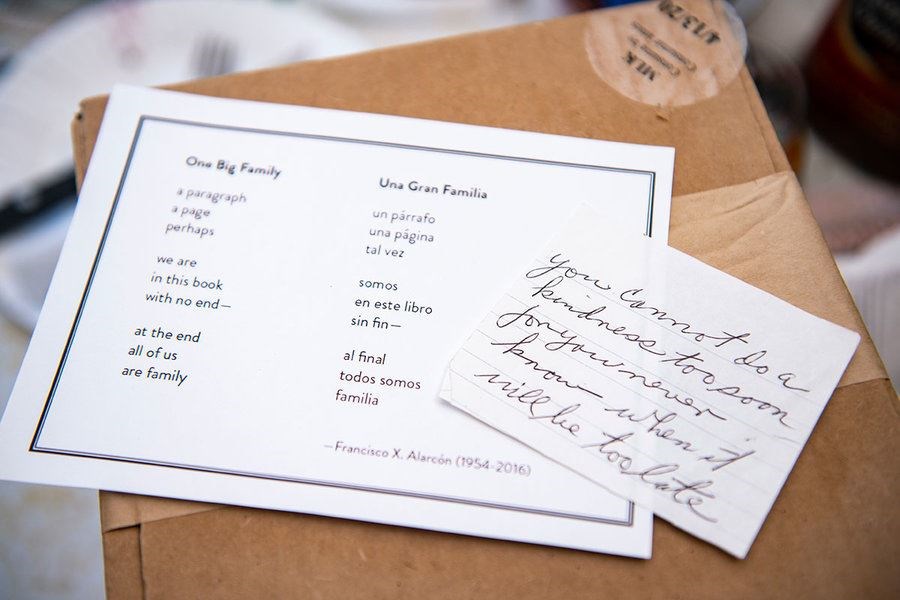Reprinted with permission from The Christian Science Monitor
The struggles of society’s most vulnerable populations, like older people, are sometimes overlooked – food insecurity, social isolation. A simple idea, delivering poems along with meals, offers a lifeline of nourishment.
FEBRUARY 21, 2029 NEW YORK - Carmella Parry has lived in her fourth-floor walk-up in Gramercy Park for over 70 years.
 Carmella Parry, a poetry enthusiast, is seen in her apartment in Gramercy Park on Jan. 22, 2020, in New York. Ms. Parry is a recipient of Citymeals on Wheels, a meal program for older people that paired up with the Poetry Society of America to provide poems in deliveries.Ann Hermes/Staff
Carmella Parry, a poetry enthusiast, is seen in her apartment in Gramercy Park on Jan. 22, 2020, in New York. Ms. Parry is a recipient of Citymeals on Wheels, a meal program for older people that paired up with the Poetry Society of America to provide poems in deliveries.Ann Hermes/Staff
At 94, she hasn’t been able to leave this small studio on the east side of Manhattan for quite a while. Her sisters Tessie and Yolanda, also in their 90s, live just a few blocks away, but like tens of thousands of older New Yorkers, they just aren’t able to get out anymore.
But Ms. Parry is a little tickled today as she tells some guests how she likes to compose a few limericks for her sisters now and then. She’ll slip them into a birthday card – which she sends through the mail – or even just recite them over the phone, since the sisters do talk every day.
“‘A sister is someone you grow up with, but never outgrow’ – I always liked that one,” she says with a chuckle. She keeps a lot of her handwritten riffs in a metal box.
“You know, if you know words, like real poets do, you could really go on – and better,” she says, still beaming. “But I just don’t know that many words!”
But words mean a lot to her, she says, and a few months ago, she received a poem, “Luck” by Langston Hughes, printed on a card that was slipped into one of her Citymeals on Wheels deliveries. Sometimes a crumb falls / From the tables of joy, / Sometimes a bone is flung. / To some people / Love is given, / To others / Only heaven.
 Carmella Parry displays a poem of her own next to a poem sent by Citymeals on Wheels in her apartment in Gramercy Park on Jan. 22, 2020, in New York.Ann Hermes/Staff
Carmella Parry displays a poem of her own next to a poem sent by Citymeals on Wheels in her apartment in Gramercy Park on Jan. 22, 2020, in New York.Ann Hermes/Staff
The poem, which Ms. Parry posted on her refrigerator last month, is part of Poems on Wheels, an ongoing partnership between the Poetry Society of America and Citymeals on Wheels, which delivers poems along with meal trays to older New Yorkers. The poem cards, featuring the work of poets like Walt Whitman, Sara Teasdale, and Emperor Koko, offer a balm to the social isolation that many of the city’s homebound seniors experience.
“The reason that it resonates with people is, first of all, it’s a very simple idea, but one that’s very powerful,” says Matt Brogan, executive director of the Poetry Society of America in New York. “I think people recognize that elderly or otherwise homebound people not only face issues around food, insecurity, and social isolation, but also a kind of cultural and intellectual and emotional isolation.”
Citymeals supplements the city’s meal delivery service, delivering more than 2 million meals a year to 18,000 of New York’s seniors, 200 of whom are over 100 years old. The program delivers meals on weekends and holidays, when the city does not provide meals. Some 57% of its meal recipients live alone and 40% rarely or never leave home, making the poem cards an important source of connection and delight.
After helping to launch New York’s Poems on Wheels in the fall of 2018, Mr. Brogan says, the poetry society partnered with other Meals on Wheels affiliates in Los Angeles last October, which reach 2,200 people each month, and plans to launch another partnership in San Francisco later this winter, which will reach 3,500 clients at least four times a year.
Considered a birthright to many New Yorkers, love of poetry can hold a particular resonance. Since 1992, the Poetry Society of America has been placing poems in New York City subway cars with its Poetry in Motion series, an idea that later spread to 30 other U.S. cities, including Atlanta, Chicago, and Salt Lake City.
As she talks about her own limericks and the poems she likes, Ms. Parry gets caught up remembering the New York she knew as a little girl. She and her sisters were born on Mott Street on the Lower East Side, part of a wave of first-generation Americans born to Italian immigrants from Sicily and Calabria.
She vividly remembers a distant afternoon in 1935, when she was just 10 years old, and she nearly became a star. After hearing her sing near her family’s apartment, a man from an Italian vaudeville theater on 14th Street asked her parents if she could perform.
“So they took me, and I sang “Senza Mamma E Nnammurata,” Ms. Parry says, remembering the mournful Italian classic. “At the time, it was good!” she laughs. “I got a standing ovation. My dad came running down the aisle with flowers!”
She moved into her apartment in Gramercy Park when she was 24, after she married her husband, Frank, who drove a tugboat on the Hudson. She’s lived here alone since he died in 1987.
Today Ms. Parry received another poem with her delivered meal, “Una Gran Familia” by the Mexican American poet Francisco X. Alarcón, in Spanish with an English translation: a paragraph / a page / perhaps / we are / in this book / with no end — / at the end / all of us / are family.
“It’s wonderful! Can I keep it?” Ms. Parry says.
The Poems on Wheels idea originated with the American poet Kimiko Hahn, a professor at Queens College in New York and president emeritus of the Poetry Society of America. She came across a group of elementary school children who were making cards to place in Meals on Wheels boxes.
“And I thought, wow, well, we could do that pretty easily, too, with a really good short poem, sort of similar to our Poetry in Motion idea,” Ms. Hahn says.
“A good poem stops us, and yet, we’re moved by it,” she says. “For me personally, I feel that poems provide this moment of pause – you just kind of hit pause, which I think is increasingly important. But I think it also is a connection to other people, and also to ourselves.”
Which is precisely why the Poems on Wheels idea fit so perfectly with her organization’s mission, says Beth Shapiro, executive director of Citymeals on Wheels.
“For us, it’s just an extension of what we believe, that we’re nourishing both body and soul,” Ms. Shapiro says. “I’m very moved when I go on meal deliveries and meet people who I believe built the city for us. It’s our duty to just keep them in their own homes and neighborhoods, where they want to be.”
“You know, they have outlived family, friends, often even their own children, so a meal coming to the door is vital,” she continues. “But so is the visit. So, seeing a poem that we sent on their refrigerator, or taped to a wall, it’s just confirmation of the value that not only the food we bring, but the caring that we do as well – it is a true lifeline for so many.”
Ms. Parry smiles at the guests who have come to talk about these poems, and offers another of her verses – one that she sort of wrote for herself, she says.
“‘You cannot do a kindness too soon, because you never know when it’s too late,’” she says, quoting herself. “Yeah, I come up with things like that. They just come to me. Nothing fancy.”
Page created on 2/21/2020 11:05:55 PM
Last edited 2/21/2020 11:17:51 PM
